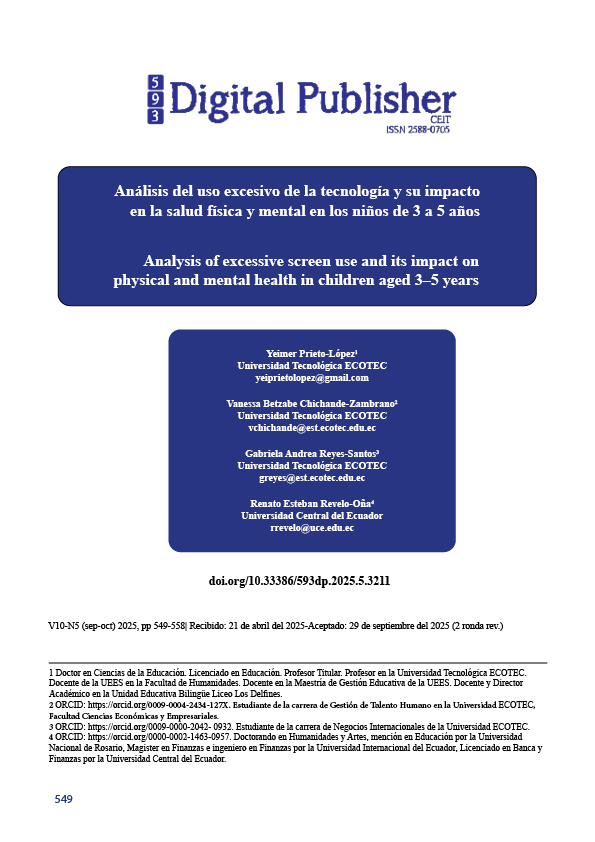Analysis of excessive screen use and its impact on physical and mental health in children aged 3–5 years
Main Article Content
Abstract
This study examines the impact of excessive technology use on the physical and mental health of children aged 3 to 5 years, a particularly vulnerable group due to their developmental stage. A mixed-methods approach was applied, combining semi-structured interviews with specialists, a focus group with university students, and a survey administered to 171 parents in Samborondón, Ecuador. The findings reveal that prolonged exposure to digital screens is associated with disruptions in basic routines (sleep, eating, and physical activity), behavioral problems, and difficulties in social interaction. Limited parental supervision and the frequent use of devices as a parenting tool were also identified. However, the study highlights opportunities when technology is used for educational purposes under adult guidance. The research concludes that setting clear limits and promoting playful, physical, and creative activities are essential to balance technology use in early childhood. Furthermore, it underscores the need to strengthen parental education regarding responsible technology use and to develop public policies that foster healthy digital environments. These results provide contextual evidence to guide pedagogical and family interventions in the Ecuadorian setting.
Downloads
Article Details

This work is licensed under a Creative Commons Attribution-NonCommercial-ShareAlike 4.0 International License.
1. Derechos de autor
Las obras que se publican en 593 Digital Publisher CEIT están sujetas a los siguientes términos:
1.1. 593 Digital Publisher CEIT, conserva los derechos patrimoniales (copyright) de las obras publicadas, favorece y permite la reutilización de las mismas bajo la licencia Licencia Creative Commons 4.0 de Reconocimiento-NoComercial-CompartirIgual 4.0, por lo cual se pueden copiar, usar, difundir, transmitir y exponer públicamente, siempre que:
1.1.a. Se cite la autoría y fuente original de su publicación (revista, editorial, URL).
1.1.b. No se usen para fines comerciales u onerosos.
1.1.c. Se mencione la existencia y especificaciones de esta licencia de uso.
References
Aguilera Meza, C. K., Santos Loor, C. P., Pinargote Párraga, B. A., & Erazo Delgado, J. R. (2020). Gamificación: estrategia didáctica motivadora en el proceso de enseñanza aprendizaje del primer grado de educación básica. Revista Cognosis, 5(2). https://doi.org/10.33936/cognosis.v5i3.2083
American Academy of Pediatrics. (2016). Media and young minds. Pediatrics, 138(5), e20162591. https://doi.org/10.1542/peds.2016-2591
Boer, M., Stevens, G. W., Finkenauer, C., de Looze, M. E., & van den Eijnden, R. J. (2020). Social media use intensity, social media use problems, and mental health among adolescents: Investigating directionality and mediating processes. Computers in Human Behavior, 116, 106645. https://doi.org/10.1016/j.chb.2020.106645
Carson, V., Hunter, S., Kuzik, N., Gray, C. E., Poitras, V. J., Chaput, J. P., ... & Tremblay, M. S. (2018). Systematic review of sedentary behaviour and health indicators in school-aged children and youth: An update. Applied Physiology, Nutrition, and Metabolism, 41(6), S240–S265. https://doi.org/10.1139/apnm-2015-0630
Carter, B., Rees, P., Hale, L., Bhattacharjee, D., & Paradkar, M. S. (2016). Association between portable screen-based media device access or use and sleep outcomes: A systematic review and meta-analysis. Sleep Medicine Reviews, 27, 51–68. https://doi.org/10.1016/j.smrv.2015.08.002
Coyne, S. M., Stockdale, L., & Summers, K. (2021). Parenting, media, and children’s screen time: A longitudinal study. Journal of Family Psychology, 35(2), 255–266. https://doi.org/10.1037/fam0000775
Creswell, J. W., & Plano Clark, V. L. (2018). Designing and conducting mixed methods research (3rd ed.). SAGE.
Domoff, S. E., Radesky, J. S., Harrison, K., Riley, H., Lumeng, J. C., & Miller, A. L. (2019). A naturalistic study of child and family screen media and mobile device use. Journal of Child and Family Studies, 28, 401–410. https://doi.org/10.1007/s10826-018-1275-1
Gómez, S., Perazzo, M. F., & González, M. (2022). Children’s digital media use during the COVID-19 pandemic in Latin America. International Journal of Child-Computer Interaction, 32, 100434. https://doi.org/10.1016/j.ijcci.2021.100434
Hinkley, T., Salmon, J., Okely, A. D., Crawford, D., & Hesketh, K. (2019). Preschoolers’ physical activity, screen time, and compliance with recommendations. Medicine & Science in Sports & Exercise, 51(7), 1468–1474. https://doi.org/10.1249/MSS.0000000000001900
Hutton, J. S., Dudley, J., Horowitz-Kraus, T., DeWitt, T., & Holland, S. K. (2020). Associations between screen-based media use and brain white matter integrity in preschool-aged children. JAMA Pediatrics, 174(1), e193869. https://doi.org/10.1001/jamapediatrics.2019.3869
Jaramillo Parra, F. E. (2024). El impacto de las TIC en la creatividad visual en infantes de preescolar: una revisión sistemática. Ciencia y Educación, 1–16. https://cienciayeducacion.com/index.php/journal/article/view/zenodo.14232778
Madigan, S., Browne, D., Racine, N., Mori, C., & Tough, S. (2019). Association between screen time and children’s performance on a developmental screening test. JAMA Pediatrics, 173(3), 244–250. https://doi.org/10.1001/jamapediatrics.2018.5056
Narváez León, I. E., & Fárez Loja, D. E. (2022). Estrategias didácticas para favorecer el proceso de aprendizaje en niños de 3 a 4 años. Revista SCIELO, 5(10), 1–23. https://ve.scielo.org/scielo.php?pid=S2665-02822022000200078&script=sci_arttext
Nikken, P., & Opree, S. J. (2018). Guiding young children’s internet use at home: Problems, strategies, and relation with parental attitudes. Journal of Child and Family Studies, 27(5), 1629–1641. https://doi.org/10.1007/s10826-017-0983-8
Orben, A., Tomova, L., & Blakemore, S. J. (2020). The effects of social deprivation on adolescent development and mental health. The Lancet Child & Adolescent Health, 4(8), 634–640. https://doi.org/10.1016/S2352-4642(20)30186-3
Radesky, J. S., Schumacher, J., & Zuckerman, B. (2016). Mobile and interactive media use by young children: The good, the bad, and the unknown. Pediatrics, 135(1), 1–3. https://doi.org/10.1542/peds.2014-2251
Strauss, A., & Corbin, J. (1998). Basics of qualitative research: Techniques and procedures for developing grounded theory (2nd ed.). SAGE.
Tremblay, M. S., LeBlanc, A. G., Janssen, I., Kho, M. E., Hicks, A., Murumets, K., ... & Duggan, M. (2017). Canadian sedentary behaviour guidelines for children and youth. Applied Physiology, Nutrition, and Metabolism, 36(1), 59–64. https://doi.org/10.1139/H11-012
Twenge, J. M., & Campbell, W. K. (2018). Associations between screen time and lower psychological well-being among children and adolescents: Evidence from a population-based study. Preventive Medicine Reports, 12, 271–283. https://doi.org/10.1016/j.pmedr.2018.10.003
WHO. (2019). Guidelines on physical activity, sedentary behaviour and sleep for children under 5 years of age. World Health Organization. https://www.who.int/publications/i/item/9789241550536
Wu, P. C., Huang, H. M., Yu, H. J., Fang, P. C., Chen, C. T., & Chen, C. H. (2022). Effects of screen time on visual function in preschool children. Journal of Ophthalmology, 2022, 1–8. https://doi.org/10.1155/2022/4515045





